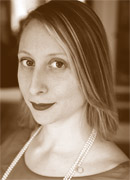
Emma Straub is a delight. Her first book of short stories,
Other People We Married, was praised by
Kirkus Reviews for its "fresh voice from a writer who deserves discovery," and Karen Russell, author of
Swamplandia!, raved, "Emma Straub is worthy of our adoration. These stories are wise, surprising, hilarious, and unforgettable."
Her debut novel, Laura Lamont's Life in Pictures, is a beautifully written, epic story of the transformation of Elsa Emerson, a Midwestern girl who escapes a family tragedy and remakes herself as the movie star Laura Lamont. Lorrie Moore wrote, "Emma Straub is a magician, full of brilliance and surprise." In the following interview, Emma describes the best part of bookselling as being able to say, "You are going to love this. This book is incredible. You have to read this." Happily in this case, Emma's words apply to her own lovely new book.
÷ ÷ ÷
Jill Owens: The stories in Other People We Married are set mostly in the present. Why did you want to write a novel that began in the 1920s?
Emma Straub: Even though there are stories in Other People We Married that had absolutely nothing to do with me biographically, they all could have. I don't have a sister, for example, but there's a story about sisters going on vacation in Palm Springs, which could have happened. Everything could have happened to me, and I was so tired of that. [Laughter]
I wanted to get as far outside of my own body and my own life as possible. I'd never written anything historical before. But I don't really think of Laura Lamont as being a historical novel.
Jill: I almost called it a historical novel, though it doesn't really feel like one. But I suppose technically it is.
Straub: Yes, but it's set in the last hundred years. I guess when I think of historical novels, I think of Anne Boleyn and corsets — stuff like that. And my book... well, I guess my book has some corsets.
Jill: You do have corsets.
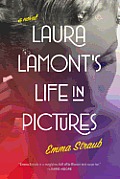 Straub: But nobody gets beheaded. [Laughter] So I don't think of it as a historical novel, but I did actively try to think of something that was outside of my regular purview.
Straub: But nobody gets beheaded. [Laughter] So I don't think of it as a historical novel, but I did actively try to think of something that was outside of my regular purview.
Jill: What kind of research did you have to do for this novel?
Straub: I had to do so much research. I had no idea how much fun research could be. It turns out, to my great delight, that if you write a book about something that is really fun and interesting, research is also fun and interesting. [Laughter]
I started doing research by going to my local public library and checking out a couple of books on the Hollywood studio system, just so I had a very basic understanding of how things worked. I started reading more movie star biographies and books about old Hollywood. Then I went on a short research trip to California and went on a couple of studio tours. I went back a few months later for a month and spent as much time as possible at a special collections library operated by the Academy of Motion Pictures, which is the organization that gives out the Oscars.
They have this incredible, incredible library in Los Angeles that is filled with every single book about the movies. Not only do they have every book about every person you might be interested in, but they also have all of the 1930s fan magazines on microfiche and clipping files on everyone. It was just delicious. I loved it. It's the kind of place where you're only allowed to bring in a pencil and a cardigan. You can't bring anything else. You can't bring your purse; you can't bring a telephone.
Jill: What ended up being the most useful to you from all this research in terms of writing the book?
Straub: I had heard from several friends of mine who had written things that required research that the point was not to cram everything in, but just to give myself a strong enough background in the subject matter so that I could choose to include details or not. But I didn't want to ram everything I'd learned down my readers' throats. So, I was careful not to include everything.
I think my favorite part of doing research was one of the actual studio tours because, up until then, everything I knew about a studio was from Singing in the Rain and Citizen Kane. Everything I knew about the movies was from the movies.
It was incredible to be on a real golf cart driving around Paramount Pictures and think, Oh my God! That's how they do that? That's what this looks like? It was amazing. I loved it. They have a parking lot that is really enormous, sort of graded, and it's painted blue because when they need to film ocean scenes, they move all the cars and fill it with water.
Jill: I would never have known that.
Straub: I'm also very easily impressed. [Laughter]
Jill: Laura's character is interesting in that she makes explicit something that we all have to do, which is to contain very different selves, or very different versions of our self. What interested you about exploring that idea?
Straub: It's something I think about a lot, the idea of a public persona and a private persona. Even the ways in which we present ourselves to our bosses might be different than the way we present ourselves to our parents or our lovers or our enemies. I thought that this was the most fully realized way to get inside that issue, to get inside the way that people bifurcate their personalities, whether it's in order to succeed or in order to survive. I think that people have different reasons for doing that. Thinking about an actress, who has to literally put her previous self away, seemed like a good way to access those kinds of feelings.
Jill: You said this was as far outside of your experience as possible, but I was wondering if you had done any acting?
Straub: Well. [Laughter] I was an extra in Noah Baumbach's movie The Squid and the Whale.
If you pause the movie at a very precise moment... It's in a classroom scene with Jeff Daniels and Anna Paquin. They show the creative writing class. Funnily enough, one of the other extras is Liz Meriwether, who now writes New Girl. But the camera goes around the creative writing classroom, and then we all get up and leave. You can see me, wearing a backpack, with a half ponytail, which is how I've always envisioned myself having my big-screen debut. [Laughter]
Really, I am a terrible actress. There is just no hope for me. You know, I was in plays in summer camp and high school, but I'm really bad at it. But I do think that actors and writers — fiction writers — have a great deal in common because both jobs allow you to be other people. I think that one is external and one is internal, maybe.
Actors do that publicly. It involves their body and their face and their voice, whereas for writers, it's all about your brain, which is vastly preferable.
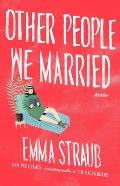 Jill: That's interesting that you're saying that, in light of what you brought up about all the characters in Other People We Married being within the realm of your possible experience, because I was really impressed with your range. There's a pretty dramatic age range, and gender, and family type, and a lot of the characters are parents... It seemed like you cast yourself wide, in terms of all those different kinds of experiences.
Jill: That's interesting that you're saying that, in light of what you brought up about all the characters in Other People We Married being within the realm of your possible experience, because I was really impressed with your range. There's a pretty dramatic age range, and gender, and family type, and a lot of the characters are parents... It seemed like you cast yourself wide, in terms of all those different kinds of experiences.
Straub: Thank you. You're right, there are a lot of different kinds of characters. I'm not a parent. I'm not gay. I'm not a widow. There are a lot of characters in the story collection that I am not, but it seems like, with just minor tweaks, it could have happened to me. It's all close enough. That's one of my favorite things about writing fiction, that you can be anyone, and you can think about all these problems that you don't have — and all the problems that you do have — and work them out.
In my fiction, if I am working in a situation that is actually autobiographical, I always find that I leave it feeling more sympathetic to the other side. If I write something that is a thinly veiled take on an argument I had with my mother, I will always make the mother character more sympathetic than the daughter. It's my way of evening things out.
Jill: I love the other characters in the new novel, too. I don't want to give anything away, but I feel like you do a really lovely job of making them believable, in part by having some of them act in unexpected ways or having their lives turn out differently than I had initially thought they would.
Straub: I teach writing workshops here in New York at the Sackett Street Writers' Workshop. One of the things that my students and I often talk about is the difference between writing a short story and writing a novel. What can you do in a short story that you can't do in a novel? What can you do in a novel that you can't do in a short story? One of the things I think you can do in a novel is really, really have fun with secondary and tertiary characters.
Some of my favorite people in the novel are characters who really don't have that much page time. Like Gordon Pitts, Laura's first husband: I love him so much. He's a terrible guy. He's a bad husband. He's a bad father. I won't spoil what happens, but I'd just like to say that I felt like he got what he deserved, and it was really satisfying to be like, No. You're awful. You're awful, and she hates you. Yeah. That's the really fun stuff. [Laughter]
Jill: Ginger was one of my favorite characters. She's a pretty strong presence, even though she doesn't get a ton of page time. And while I was watching her character grow and evolve over the course of the novel, I was rooting for her.
Straub: Yes, I like Ginger too. You asked earlier about things that I discovered in my research, and Ginger is sort of loosely modeled on Lucille Ball. One of the things that I didn't know that I learned during the research is that she became the first female studio chief. She was initially a dramatic actress, a sort of sultry movie star, but that never really went anywhere. Then she discovered that she was a comedian and that people loved her when she was funny. Then, of course, she had enormous success doing I Love Lucy, and then she and her husband had their own studio. When they split up, it was hers, which just blew my mind. Because when you think about I Love Lucy, you think about chocolates and conveyer belts and goofiness. But not only was she really smart and driven, she was also a businesswoman and really hugely powerful. I loved that. I loved Ginger, who's Laura's best friend, really, having some of that. Like, "I'm taking over."
Jill: Yes, exactly. And I didn't know that about Lucille Ball, either.
In the story "Orient Point," there are two great sentences, each describing one of Marjorie's children: "When the children had watched 'Peanuts,' Matthew liked Linus most of all," and "Kate had the kind of look that nobody questioned. She should have been hired by terrorists."
Those are just great, telling details that show a lot about their characters really quickly. How do you think about your prose on a sentence level like that?
Straub: I love details, and I love funny details in particular. I think when I write stories, my goal is always to have them be both really funny and really sad, simultaneously. I want to make the reader laugh, then be like, Oh. Oh. That is my goal. [Laughter]
I tend to write pretty quickly, so sometimes I'll write just the first draft, and I'll think, OK, that's just so I have the shape of the story down. Now I have to go back and actually make it real.
Sometimes the sentence-level stuff comes in subsequent drafts. But sometimes, I think because I do write pretty quickly, when I go back to start revising, I'll find things that I have no memory of having written. Absolutely no memory. So, I'll read it and I'll be like, Oh, that's not bad. And I tend to surprise myself with details like that, with little offhand remarks. That's always nice. That's like a little present to myself, when I go back and realize that I've already written something that isn't half bad.
But I'm like anyone else; I think that sentences come after going over them again and again and again. I think I'm finally old enough to understand the revision is the hardest part. [Laughter]
When I was younger, I thought, Oh my God, writing is so hard. I always thought that actually getting things down on paper was the hard part. And it's not. Getting things on paper is the fun and purely imaginative and magical part, but revising is where the real work gets done.
Jill: I think you sum up the tone of the stories really well. I was going to say they're kind of wry and funny, and yet disturbing at the same time. But the tone of this new novel is really different. I'm not sure what I would call it. It's more sincere, or innocent or something, at least at the beginning.
Straub: I knew from the beginning that I wanted it to be sort of an epic story in terms of the scope, in terms of the time that passes. So I wanted the tone to be a little bit removed. I mean, obviously you're very close to Laura throughout, but I wanted it to feel a little bit further away so that the reader is watching everything happen with enough distance, where you can feel like you're not so much inside Laura's head that you couldn't see the bigger picture. I always wanted the bigger picture to be looming there; I wanted you to know that there was still much more to come. Because I think I could have written an entire novel just about her early years in Hollywood, which would have been closer to her. But I was interested in the whole thing, and in order to do that, I felt like I had to back up a little bit.
Jill: You really made Wisconsin and Laura's young life there vibrant and idyllic. I wanted to live in her childhood house. [Laughter] What's your experience with Wisconsin?
Straub: My entire family is from Wisconsin. Not from Door County where Laura grew up, but my parents both grew up in Milwaukee, and my father's extended family still owns and operates a dairy farm on the northwestern side of the state. I went to graduate school in Madison and lived there for three years. So I have a real fondness for Wisconsin and Wisconsinites.
In some ways, it could have been set anywhere in the Midwest, but Wisconsin is the place I know best, and Door County really is that idyllic. It really is that beautiful. And I wanted her to be from the most beautiful place on Earth. I wanted her to have this really classically gorgeous and green childhood.
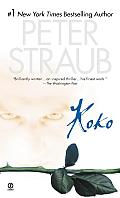 Jill: I somehow did not know until recently that your dad was Peter Straub. I don't know how I missed that. I have so loved some of his books. I reread Koko more often than I want to admit.
Jill: I somehow did not know until recently that your dad was Peter Straub. I don't know how I missed that. I have so loved some of his books. I reread Koko more often than I want to admit.
Straub: Yay, yay!
Jill: You probably get this question all the time, but what did you learn about writing from him? And do you have a favorite book of his?
Straub: I learned a lot about writing from him. I think some of my earliest memories are listening to my dad tell me stories, just made-up stories about whatever was around us. Having imagination was always the most important thing in our house. Whether it was telling stories or being able to tell a joke, that sort of thing, it was always really important in my house. And certainly books. There are books everywhere in my parents' house: stacked next to the dining room table, bookshelves in every room, et cetera. So, I always knew that books were really, really important, and I never for a second thought about doing anything but being a writer.
In terms of specific lessons that my dad taught me, I think the most important one is that he showed me that being a writer is like having any other job, that you have to do it every day and that you have to take it seriously. It has nothing to do with waiting for a muse to strike. I mean, there's nothing precious about it. You get to your desk and you get your pages done. That's the only way it works. I mean, that's the only way it works for me, certainly. I guess maybe there are people who are happy to only write when they're feeling inspired, but they probably don't get very much stuff done. I'm not interested in being the kind of writer who works that way. I like to work. I'm a hardworking writer, and I want to write books, and I want to write novels. I feel like I'm just getting started, and my dad is the best model I could ask for because he's written, I think, 20 novels or so.
Jill: And they're often quite long novels.
Straub: I know! He writes much bigger ones than I do. [Laughter] More generally, my dad is the absolute best. I talk to my dad on the phone pretty much every day. He is just the smartest and the funniest guy in the world. He's absolutely the best.
In terms of books that Powell's readers should read, there are so many of them. The book that I usually recommend to my friends, as an easy Peter Straub entry point, is one called Mystery. It takes place on the Caribbean island of Mill Walk, which is basically Milwaukee if it was a Caribbean island, which is hilarious already.
Jill: That's reason enough to read the book, right there.
Straub: There are so many. I really, really like one called Lost Boy Lost Girl, which is a more recent novel. That one is really very beautiful and sad. Koko, which you mentioned, I read when I was about 12 years old, at summer camp, and I was like, Whoa. [Laughter] There's The Talisman that he wrote with Stephen King, which is also an incredibly fun book. He's written so many. One should read them all.
I have been forbidden from reading his first two, so I have not read all of them. His first novel was called Marriages. He seems really embarrassed by it, because he was in his 20s when he wrote it, and he says that it's not very good, and so I shouldn't read it. But I think that it's that he doesn't want me to read it because it's all really about my mother's family, and he just doesn't want to get in trouble. [Laughter]
Jill: Are you currently opening for the Magnetic Fields, or is that going to happen sometime soon?
Straub: That's in November.
Jill: Are you doing readings before they play?
Straub: Yeah, I haven't quite figured it out yet, but I think I'm going to read a little variety of short pieces. Stephin Merritt from the Magnetic Fields has told me that he will teach me how to play the ukulele, so I'm hoping to learn how to play one song so that I could also play one song. But so far I have not learned a single chord, so get back to me on that. [Laughter]
Jill: Well, you have a little time, if it's not until November. Do you have a ukulele?
Straub: Stephin is giving me one, and then I said something on Twitter about how I wanted a pink ukulele. And then this lovely woman, who I know has been published by your colleague Kevin Sampsell...
Jill: Chloe Caldwell?
Straub: Yes! She wrote me, and she was like, "Oh, I have a pink ukulele."
Jill: Of course she does. She seems like exactly the person who would have a pink ukulele.
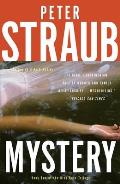 Straub: So I think I am soon to have two ukuleles in my possession, but I have yet to learn how to play even one of them.
Straub: So I think I am soon to have two ukuleles in my possession, but I have yet to learn how to play even one of them.
Jill: I have faith in you. [Laughter]
So you also work at BookCourt, an independent bookstore in Brooklyn. I know it's really hard to choose, but I was wondering if you had a favorite thing about being a bookseller.
Straub: There are a few things that I really, really love about being a bookseller. Number one, it's just really satisfying, not as a writer, but as a person with a lot of opinions about books, to be able to put a book in someone's hands and say, "You are going to love this. This book is incredible. You have to read this." That's my favorite part. I love that. That's like a drug that they should bottle and sell.
One of the other things that I really love about BookCourt is that it's in such a wonderful neighborhood, and there are so many people who I've gotten to know over the last three years working there. I've gotten to know small children, who were two when I started working there, who are now in kindergarten and able to have long, extended conversations with me. The people, the customers, are fantastic. Obviously, the staff and my bosses are very nice to me, but the customers at BookCourt have been so supportive of me as a writer that it just makes me want to cry. They're so sweet, and they're like, "When is your new book coming out?" They're just really wonderful, wonderful people. I love it.
Of course, because it's Brooklyn, it's also fun when Martin Amis walks in. That sort of thing. You know, we also get movie stars, too, sometimes, but the writers are more exciting. [Laughter]
Jill: This is kind of random, but I was reading one of your past interviews and you mentioned that you really liked the movie Jennifer's Body, which I just saw for the first time about a month ago when my best friend made me watch it. I thought it was fantastic, but nobody else that we know likes it. I think we need to make it more popular, somehow.
Straub: Yes! J-Bod. That's what my husband and I call it. We call it J-Bod. I love J-Bod. I love horror movies. I love movies that are set in high school, and I think it's the funniest movie Diablo Cody has ever written. I think it's amazing. I think Megan Fox should have won an Oscar. [Laughter]
Jill: She's fantastic.
Straub: She's fantastic because it's so easy to believe that she is a murderous succubus.
Jill: Yes!
Straub: I love movies. The reason that I wrote Laura Lamont was because I love the movies, and I love going to the movies. And, yes, that means going to see Audrey Hepburn movies at the Film Forum, but it also very much means going to see J-Bod. I am no snob. People can call me many things, but a snob is not one of them. I'm glad to have you on the J-Bod support team. J-Bod 4-Eva!
I spoke to Emma Straub by phone on August 13, 2012.